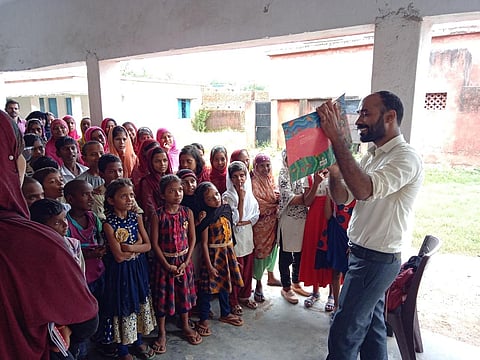

RANCHI: As he kept climbing the academic ladder abroad, Mohammad Sajid Hussain (35) realised how outdated the one-way dissemination of knowledge from teacher to students through monologue was. He figured that was why his fellow students back home fell off the knowledge radar.
So, Sajid quit his high-flying job at the National Aerospace Laboratory (NAL), returned to Chitarpur, his village in Jharkhand, to start a Schoolasium – a portmanteau word coined by combining school and gymnasium – to change the way the underprivileged were taught. Seven years on, Schoolasium has turned into a resource centre for schools attempting to emulate its experiential learning model. Sajid claimed his model has been adopted by over 120 government and private schools in Gumla, Palamu, Koderma, Hazaribagh, Ramgarh, Jamshedpur, Dhanbad and even in some districts of Bihar.
At Schoolasium, instructors make students exercise their brains through practical lessons, similar to the way physical workouts build body muscles. This teaching methodology is called Maker Oriented Pedagogy (MOP), which is a play-based learning system seeking to make children problem solvers through practical life lessons.
Recalling how lack of support from their school stopped many of his classmates from realising their true potential, Sajid said: “I returned to my village to change the learning process. Things here are not in tune with the technological transitions across the world. I want the learning process in rural areas to be vibrant.” Sajid studied at a madarsa till class VI, before joining Chitarpur High School. After doing his Masters from IISc, Bengaluru, he went to Germany to earn his PhD and returned to India in 2012, when he landed the NAL job.
His exposure to varied teaching models made him realise that a combination of poor academic condition and lack of access to educational infrastructure was the reason behind students failing to realise their full potential.
Teach youngsters how to solve problems, says Sajid
Sajid believes the requirements of a 21st century child are different from what is being currently taught in schools. There is a paradigm shift as one’s life is being controlled by technology, he said. “Other than that, the nature of job in the markets is changing as innovation and robotics have started dominating our lives. The big question is where human beings fit.
Therefore, there is going to be a major shift in the field of technology as everything will be done automatically sitting at home. In such circumstances, my research is on how the learning will take place which could prove to be beneficial for the children in the next 15-20 years,” Sajid said.
“We are trying to take rural children at that level where they can solve problems and also making efforts to take them out of the current static curriculum,”he added. “You must agree that problem solving skill will always remain with humans. In other words, human being will always have the ownership of problem solving skill or what you call decision making. It must be inculcated into the younger generation at the initial stage,” he pointed out.
“We charge Rs 500 per child to meet our financial requirements. Some fund is allocated by the district administration for setting up laboratories in government schools under various schemes. More than 26,000 children are benefitting out of this concept,” said Sajid.
The Best Innovative Idea School Award by Jharkhand was conferred on Sajid for his innovative approach in 2019. Now, he aims to set up an open-air school without textbook and walls where children will not be burdened with books, instead they will be taught lessons from the experiences of day-to-day lives by making use of the things around them.